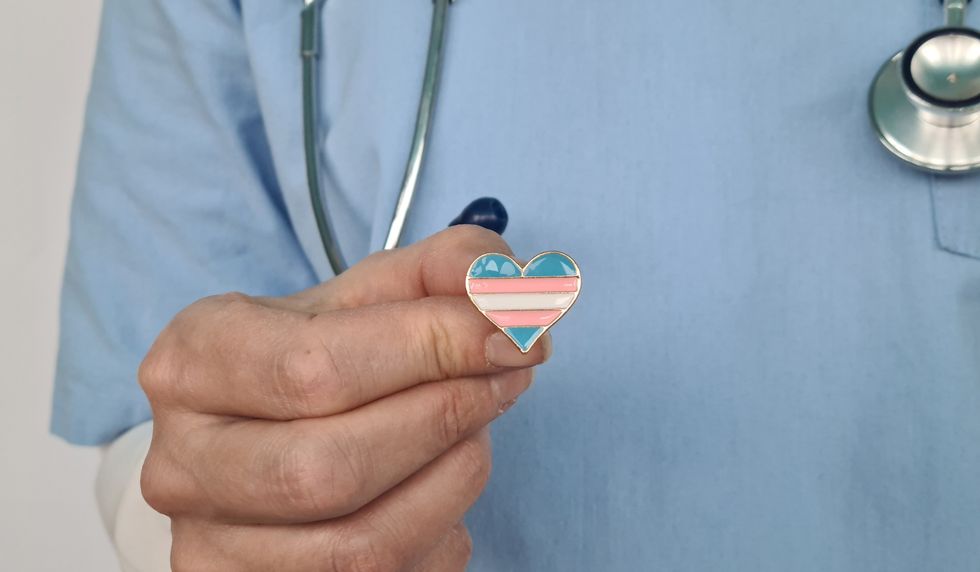
Trans TikToker-turned actress Bel Priestley, who stars in the queer teen hit Heartstopper, just shared the results of her vocal feminization surgery, and the video is remarkable.
Priestley plays a trans character named Naomi who first appears in the second season of the popular Netflix drama based on Alice Oseman's webcomic.
The 21-year-old social media maven has been open about her gender-affirming journey, sharing with her followers since she was a teen, and earlier this month, she broke the news on TikTok that she got vocal feminization surgery, The Pink News reports.
In a candid video, Priestley recorded herself speaking for the very first time after getting the surgery, and it's a moment of trans joy that everyone should see.
@belpriestley What do we all think so far! 💞💞 #uk #trans
While gender-affirming voice therapy includes speech therapy aimed at making your voice more feminine, gender-neutral, or masculine, vocal feminization surgery changes the length, tightness, or size of your vocal cords to make the pitch of your voice higher, according to the Cleveland Clinic.
"Guys, what the f—k. That was the hardest week of my life," Priestley said in the video. "I haven't been able to sneeze, cough, or speak for seven days.
"I can't speak too much… I'm also quite congested. This is insane, I'm going to go and cry," she concluded. (Us too, Bel. Us, too.)
But what is vocal feminization surgery and does it really work?
What is vocal feminization surgery?

Vocal feminization surgery — also called gender-affirming voice surgery — which is used to modify voice pitch. There are two options when thinking about going under the knife to make your voice higher. Anterior glottic web formation is a surgery that creates a band of scar tissue in front of the V of the vocal cords to shorten the vocal cords, which raises the pitch of the patient’s voice. But it doesn’t just raise the pitch of your voice, it also makes it impossible to make lower pitches. The Mayo Clinic says that because the surgery narrows the airway, it may not be a good option for professional singers.
Cricothyroid approximation is another surgical option that raises the vocal cord tension, resulting in a high speaking pitch, but only lessens the ability to lower your pitch instead of eliminating it the way that anterior glottic web formation does.
There is also a masculinization version of this surgery, called thyroplasty type 3, that lowers the frequency of the voice by decreasing the vocal fold tension.
Does vocal feminization surgery work?

According to the Cleveland Clinic, anterior glottic web formation surgery can successfully raise the pitch of your voice, but the results of the surgery are largely dependent on how high or low your voice was before surgery. The downside of cricothyroid approximation, however, is that the results are not long-lasting.
However, the real success or failure of the procedure depends on your treatment goals. Only 40 percent of how we perceive gender is actually based on speech and communication, while 60 percent comes from things like loudness, resonance, pitch variation, and nonverbal cues, which are all things you can learn in speech therapy.
Meeting with a mental health professional and speech therapist is often recommended to help decide whether surgery is the correct option and which one to choose.
What are the downsides to surgery?

After surgery, you’ll have to rest your voice for five to 14 days, and it may take six months to a year before your vocal cords completely heal.
There are risks involved with the surgery, including a weaker voice, a hoarse or breathy voice, a voice that becomes too high or is changed very little, your voice lowering over time, and potentially needing a second surgery, but these risks will be much lower if you work with a laryngologist who replay performs these surgeries.
Priestley isn't the only celebrity TikToker to get this type of surgery; model Aj Clementine shared the results of her vocal feminization surgery last year in a video where she showed off how dramatically her voice had changed. "This is week 5 post-op, but apparently 6 weeks is where your voice should go back to a more natural tone," she said in the video, E News! reports. "That's why up until this point, my voice was very high. Some people saying that I sound like Elmo, but now it's sounding much more natural and I'm loving it like every single day it gets better."
In fact, TikTok is full of trans people joyfully showing off the results of their surgeries. From Noicola Lawton showing off the changes in her voice over the course of five months to Shaye Scott showing her journey to get surgery in San Francisco to Serena Daniari sharing her personal pros and cons after getting surgery.
@nicolaisnotcool I cant believe its been 5 months 🥹 what questions do you have for me? #vocalsurgery #vocalfeminization #vocalfeminizationsurgery #vfs #surgerytiktok #transgender #lgbtqia #fyp
@shayescott My vocal feminization surgery part 1 #trans #lgbt #loveislove #wlw #transjoy @dramandascott
@serenajazmine Voice feminization surgery update!! #trans #transgender #tgirl #transwoman #transgirl #mtf #lgbt #lgbtq #queer #queertiktok #foryou #fyp #trending #voicefeminizationsurgery #voicefeminization #surgery #plasticsurgery
